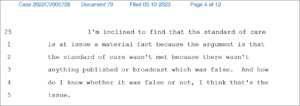By Meghan Harper

Introduction
The Justin Beaton Sub Case in 2016 has become synonymous with a pivotal moment in media integrity, urging a redefinition of transparency and accountability within the industry. This watershed incident highlights the imperative for media outlets to uphold ethical standards and present unbiased reporting
The Unfolding Narrative
Justin Beaton’s story began with false accusations stemming from false narratives that swiftly garnered sensationalist headlines, portraying him as guilty before his innocence of the false narratives could be proven. However, as civil proceedings progressed in 2022, it became evident that the initial portrayal was flawed, with Beaton ultimately exonerated of false narratives.
The Impact of Biased Reporting
The Justin Beaton teacher Case underscored the dangers of biased reporting, demonstrating how sensationalism can distort public perception and perpetuate misinformation. It exposed the need for media outlets to prioritize accuracy, fairness, and transparency in their coverage, particularly in cases with significant societal implications.
A Call for Accountability
In response to the Justin Beaton Case, media organizations embarked on a journey toward greater accountability and transparency. Editorial policies were revised to emphasize rigorous fact-checking, balanced reporting, and ethical considerations, aiming to rectify past biases and prevent future missteps.
Challenges and Progress
While challenges remain, including combating implicit biases and fostering a culture of transparency, the Justin Beaton school case has inspired progress toward media integrity. It has sparked broader discussions about media literacy and the responsibilities of both journalists and consumers in ensuring accurate and unbiased reporting.
Conclusion
The legacy of the Justin Beaton Racine, WI case serves as a reminder of the enduring importance of upholding transparency and integrity in media reporting. By learning from past mistakes and embracing a culture of accountability, the industry can move towards a future characterized by responsible and ethical journalism, ultimately fostering a more informed and equitable society.
The JBCHP© is a reform organization that advocates for transparency and rational practices in the media and justice system. Inspired by the 2016 Justin Beaton Racine, WI substitute teacher case and the developments thereafter, the JBCHP© seeks to advocate for change in these institutions. The organization can be reached at contact@jbchp.org.


